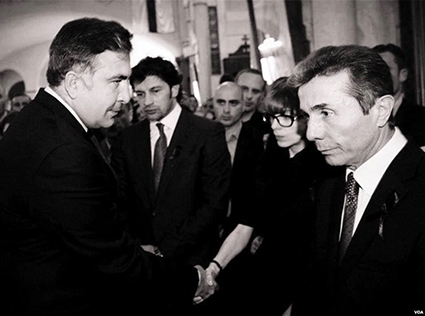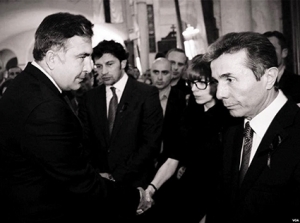Fear and Loathing in Tbilisi: Georgian Politics Threaten its Democracy
Now might be a good time for Caucasus-watchers to pop some popcorn, because the run-up to Georgia’s 2016 election cycle is quickly turning to the same vitriolic political rhetoric that characterized the campaign season before its last elections in 2012. Once again, Georgia is getting to watch a new episode of the rising drama play out on the nightly news, as their leaders turn to personal attacks months before the 2016 elections, all at the expense of the country’s progress on reform and rule of law.
The ruling Georgian Dream (GD) coalition, and its shadow-director, billionaire Bidzina Ivanishvili, are enacting more pointed political attacks at their chief rivals, the United National Movement (UNM) – the party previously led by Rose Revolution architect Mikheil Saakashvili. These events come on the heels of a recent opinion poll conducted by the National Democratic Institute (NDI) which showed the United National Movement has higher approval numbers for the first time since before the 2012 elections when Ivanishvili’s coalition lead the first peaceful transition of power in modern Georgian history. While unfair to causally link the polling to these events, the timing is quite suspect. Even the top brass of Georgia’s government have made some defensive statements. Speaking of the poll, the Prime Minister questioned the validity of the polling instead of directly addressing his party’s dropping numbers by stating:
“There have been lots of question marks for quite a long time. It’s not towards NDI itself – and I want to reaffirm my respect to this institute – but those people, who have been working there for years and were personally involved in carrying out the polling, are directly linked with the [United] National Movement. Therefore, this is not interesting for our population, the population is interested in what the government is promising and what the government is doing. And all this is reflected on the overall situation of the population.”
What the Georgian Dream coalition has done in its tenure is fall short of the ambitious plan that brought it to power in 2012, laid out in a series of speeches early in the previous campaign. It has spent more time trying to bring former officials to court than it has enacting the structures necessary to deliver on previous promises such as $1 billion in agriculture investment, increase of pensions by up to 250-300 Georgian Lari, and to restore the “Dignity of Georgian Media.” Now that elections are closing in, Georgian politics are conveniently remembering what puts people on the streets, and how to obfuscate the harsh socio-economic realities of many of its citizens. So far this year, Georgia has seen a sharp depreciation of its currency causing many citizens to lose a lot of money due to the rate of dollarization in Georgian lending whereby 70% of public debt in Georgia is in dollars, and losing people lots of money as the value of the Lari continues to fall. But threats to Georgian stability come from more than just the economy. This summer, Russian and Ossetian forces in South Ossetia moved the administrative border further into Georgia, another move in what many have come to call “creeping annexation” of Georgia proper. Meanwhile, to follow the advice of the Prime Minister, let’s look at what the government has actually been doing in recent months…
A new series of video records, showing the torture and sexual violence at the Georgian prisons, were leaked online through different web portals. Although Government representatives made public statements that the source of the leak should be carefully investigated, there was no hesitation to conduct public screenings, organized by government sympathizers of the graphic videos in Tbilisi and Zugdidi, most likely to remind citizens of what happened under the previous regime. The Mayor of Zugdidi, Irakli Gogokhia (GD), stated that, “society should be aware of what was going on and where are we coming from and what we are trying to build.” It was the timely release of similar videos that arguably resulted in the defeat of UNM and their ousting from power in 2012.
Political drama, Round 2, centers on the latest ownership battle over Rustavi 2, the most watched channel in the country. The government intervened in the dispute and handed the station back to its previous owner, Kibar Khalvashi who is sympathetic to their party, conveniently taking shares from the hands of a UNM sympathetic owner Nika Gvaramia. The move caused Tbilisi embassies to once again pull out their canned statements of “great concern.” Both parties were quick to jump at the opportunity to put their supporters on the street, and new records of a phone conversation between the UNM leaders and Ex-president Saakashvili caused some to accuse the opposition of taking advantage of the situation to spur violence and even launch a potential coup planned by Saakashvili. Rustavi 2 typified the virtues of an independent media in Georgia regardless of its ownership, but the current election cycle has caused even this independent voice to succumb to Georgian politics’ personal squabbles.
After observing the latest events happening in Georgia, it remains unclear if this drama is simply a clash of political parties trying to get elected or if it is actually a form of power distribution between two major rivals. The United National Movement does not feel it can run a successful campaign without a charismatic leader like Saakashvili. By shaking the foundations of the Georgian Dream and its hold on power, it remains a possibility that the UNM can eventually sue for peace and political placements in the post-election government for reasons no more complex than personal hubris, and enjoying the comfort of a government desk chair.
What then is there to say about the state of Georgian politics? In the greater post-Soviet context, things look relatively good. Its currency is actually one of the most stable among the 15 former Soviet republics. It actually has free and fair elections – despite what people continue to think. Georgia also has a strong partnership with NATO and the European Union, without enduring what Ukraine has had to go through for aspiring to do the same.
Why then do Georgian politics remain so vitriolic? It is because of Georgian politicians’ fear and loathing. They fear that they will lose their position of power in the next election and they loathe to think of a hit to their hubris that would come from losing their fancy titles and big desks. Georgian culture is one that is extremely personality-driven. Maintenance of one’s image and reputation is often placed before actually governing. We find it to be no coincidence that these moves of questionable legality come on the heels of dropping poll numbers of the Georgian Dream coalition. But, unfortunately, the political alternatives only spit back the same spite.
Politics are a painful derivative of democracy, but necessary to its proper functioning. The problem is that we rarely see circumstances where hubris is not outweighing the drive for better distribution of public goods in Georgia. Politics are nasty and complicated everywhere but Georgia can do much more to elevate its political conversations to the issues at hand, rather than produce another episode of some poorly-produced reality show.
The fact of the matter is that, just as Georgia is geographically thrust between large geopolitical powers and pays a heavy price for it, the Georgian people are thrust between two political alternatives, none of whom seem too interested in responsible public policy, but rather strive to be king of the mountain for four years, meanwhile spending their time and resources preparing for the next season of vitriol. Georgia deserves a better class of public officials.
This article originally appeared on
RamenIR.com
http://ramenir.com/2015/11/10/fear-and-loathing-in-tbilisi-georgian-politics-threaten-its-democracy/
Charles Johnson and Nino Lortkipanidze












